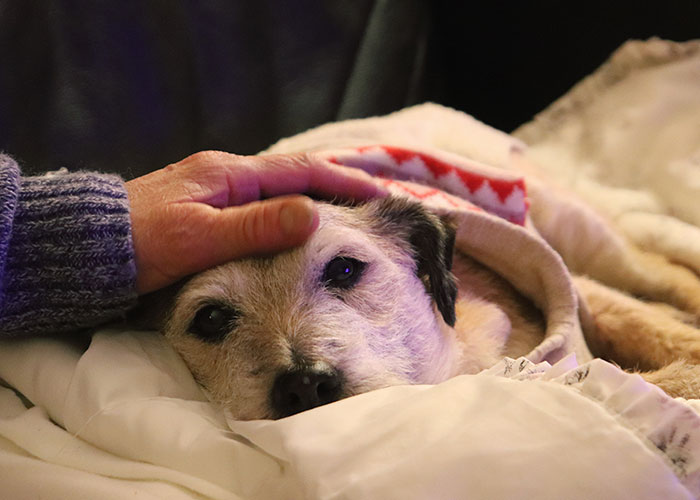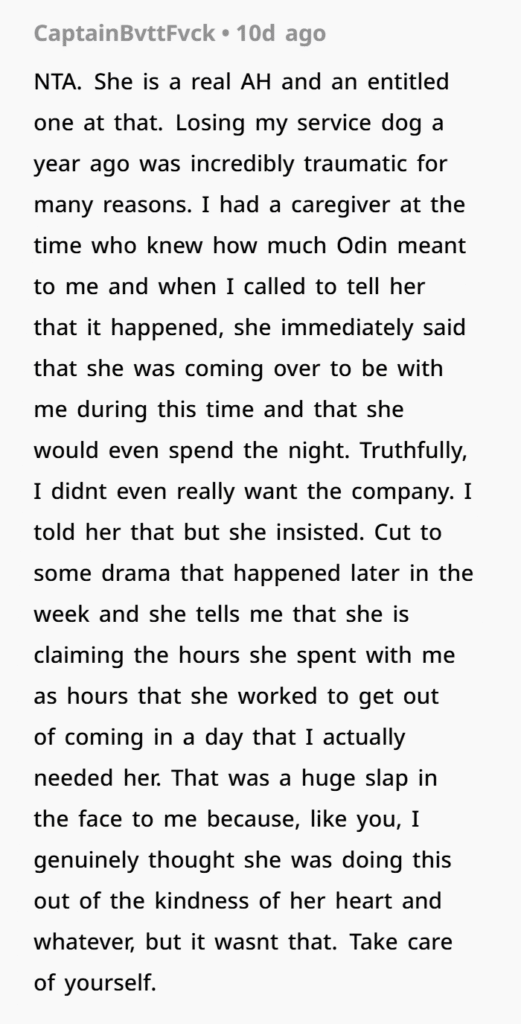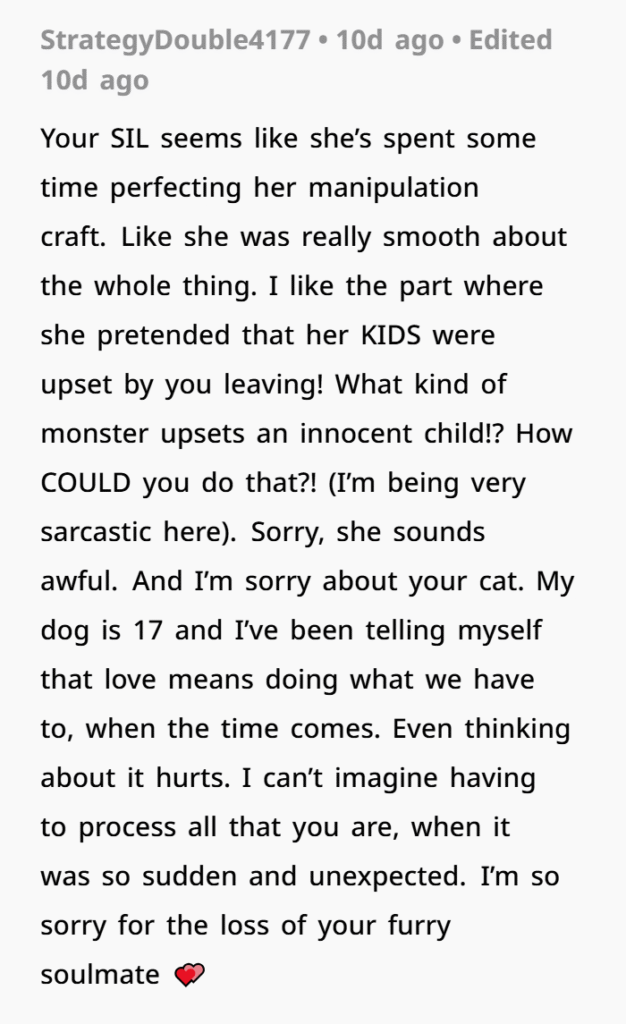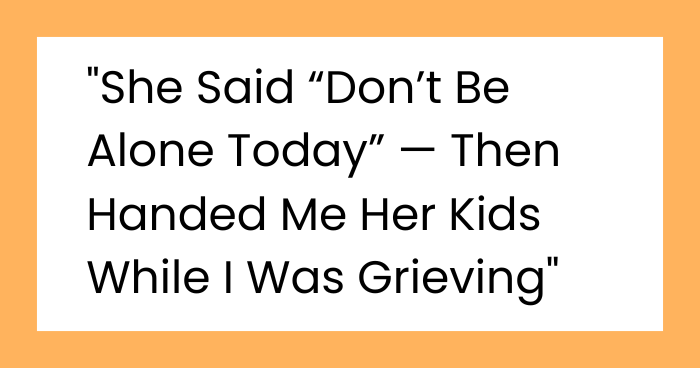“I Invited You So You Wouldn’t Be Alone”—But She Just Wanted a Free Babysitter While I Grieved
Losing a beloved pet can feel like losing a piece of your soul—especially when that pet has been your emotional anchor for years. So when a young woman was grieving the sudden loss of her cat, she welcomed her sister-in-law’s offer to “not be alone.” But what was supposed to be emotional support turned into unpaid childcare, and she found herself being dismissed, overworked, and emotionally neglected during the darkest moment of her life.
After walking out mid-visit, she received criticism from her sister-in-law, who claimed she “stormed out” and upset her kids. But this experience raises a serious question: When someone invites you over under the guise of support, but actually expects unpaid labor while you’re grieving—who’s really being selfish?
Owners who go through the loss of a pet can feel misunderstood and isolated

So this woman was glad when her SIL invited her over after losing a pet, however, her intentions were far from pure










Grieving a Pet Isn’t “Just a Moment”—It’s Real, Deep, and Heartbreaking
If you’ve ever had a soulmate pet, you understand. They’re not just animals—they’re your constant, your comfort, your safe space. For one 25-year-old woman, saying goodbye to her beloved cat meant saying goodbye to her emotional lifeline. It was the kind of grief that leaves you empty, disoriented, and unable to function.
After holding him in her arms during his final breath, she could barely eat, sleep, or think. She called off work the next day to grieve—something all too rare in a world that still treats pet loss as “minor.”
So when her sister-in-law called and said, “Don’t be alone today. Come over,” it sounded like a lifeline.

When Support Turns into Emotional Labor
But the moment she arrived, it became clear: this wasn’t about companionship or comfort. Within minutes, they were in the car picking up kids from school. One child resisted leaving the jungle gym, and when the grieving woman didn’t chase after him, her SIL became annoyed—apparently expecting her to step in like a full-time nanny.
Back at the house, she was assigned to help with homework, all while fighting back waves of grief. She tried—twice—to talk about her cat, needing only a moment of acknowledgment. Instead, her SIL cut her off with comments like “you’re just having a moment” or “let’s not dwell.”
She felt invisible.
“You’re Here to Help”—But No One’s Helping You
The final straw? Her SIL asked her to help her son in the bathroom. At that point, she realized: no one was seeing her pain. She wasn’t a guest in need of emotional support—she was the help. A grieving woman who could barely breathe was being asked to wipe noses and referee siblings.
And so she did the only thing she could manage without falling apart: she left. Quietly. Quickly. Without causing a scene.
Later, a text arrived. Her sister-in-law accused her of “storming out,” upsetting the children, and failing to appreciate an attempt to distract her from grief.
Grief Isn’t a Distraction Game
Distraction may work for minor stress, but grief isn’t something you can “keep busy” through. Especially not when the loss is raw, fresh, and tied to years of companionship. Suggesting that someone should “take their mind off it” by babysitting children is wildly inappropriate—and borderline cruel.
According to Psychology Today, grief over a pet can be just as intense as losing a human family member. Dismissing that grief by reframing it as a momentary mood or using it to justify unpaid labor shows a shocking lack of empathy.
The Danger of Assuming Availability
This story isn’t just about grief. It’s about emotional labor, the invisible workload women are often expected to carry—especially within families. The assumption that a young woman, grieving or not, is available to help with childcare simply because she showed up is both sexist and disrespectful.
And it happens often.

As The Gottman Institute points out, women in families are frequently expected to manage the emotional needs of others even when they themselves are breaking. This “default caregiver” label becomes especially damaging when it’s used to deflect from offering genuine support.
Why Walking Away Wasn’t “Storming Out”—It Was Survival
Let’s be clear: she didn’t storm out. She quietly removed herself from an emotionally unsafe space. The moment she realized she wasn’t being supported—but used—was the moment she exercised one of the healthiest boundaries a person in grief can set: walking away from people who don’t see your pain.
To frame that as a tantrum or selfish act only adds insult to injury.
When Help Isn’t Help at All
Saying “I didn’t want you to be alone” sounds comforting. But if the actual intention is “I could use another pair of hands today”, it’s manipulative—especially when directed at someone who’s grieving. Authentic support doesn’t come with strings or tasks attached.
True comfort would’ve looked like:
- Letting her rest quietly on the couch
- Asking how she was feeling
- Listening—even for just a few minutes
- Offering a warm drink, a hug, a moment of stillness
Instead, she got errands, homework duty, and zero emotional space.
Many readers supported the woman for leaving




Grief Deserves More Than Chores
This woman wasn’t being selfish—she was trying to survive a heart-wrenching loss. She didn’t show up to be useful. She came because someone said they cared. But when grief meets indifference, the kindest thing you can do for yourself is leave.
Let this be a reminder: if someone invites you over during a moment of pain, and they hand you a chore list instead of compassion, you’re allowed to walk away. Your grief isn’t an inconvenience. It’s real. It’s heavy. And it deserves better than that.


